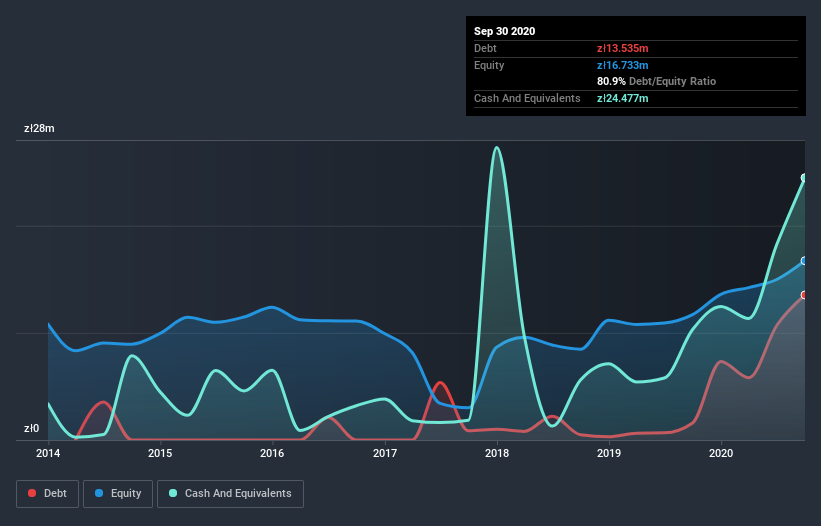David Iben put it well when he said, 'Volatility is not a risk we care about. What we care about is avoiding the permanent loss of capital.' So it might be obvious that you need to consider debt, when you think about how risky any given stock is, because too much debt can sink a company. Importantly, Sevenet S.A. (WSE:SEV) does carry debt. But the more important question is: how much risk is that debt creating?
When Is Debt Dangerous?
Debt assists a business until the business has trouble paying it off, either with new capital or with free cash flow. If things get really bad, the lenders can take control of the business. While that is not too common, we often do see indebted companies permanently diluting shareholders because lenders force them to raise capital at a distressed price. Of course, plenty of companies use debt to fund growth, without any negative consequences. When we think about a company's use of debt, we first look at cash and debt together.
Check out our latest analysis for Sevenet
How Much Debt Does Sevenet Carry?
The image below, which you can click on for greater detail, shows that at September 2020 Sevenet had debt of zł13.5m, up from zł1.59m in one year. But on the other hand it also has zł24.5m in cash, leading to a zł10.9m net cash position.

A Look At Sevenet's Liabilities
Zooming in on the latest balance sheet data, we can see that Sevenet had liabilities of zł61.2m due within 12 months and liabilities of zł24.0m due beyond that. On the other hand, it had cash of zł24.5m and zł49.5m worth of receivables due within a year. So its liabilities total zł11.2m more than the combination of its cash and short-term receivables.
While this might seem like a lot, it is not so bad since Sevenet has a market capitalization of zł27.9m, and so it could probably strengthen its balance sheet by raising capital if it needed to. However, it is still worthwhile taking a close look at its ability to pay off debt. While it does have liabilities worth noting, Sevenet also has more cash than debt, so we're pretty confident it can manage its debt safely.
On top of that, Sevenet grew its EBIT by 36% over the last twelve months, and that growth will make it easier to handle its debt. When analysing debt levels, the balance sheet is the obvious place to start. But you can't view debt in total isolation; since Sevenet will need earnings to service that debt. So when considering debt, it's definitely worth looking at the earnings trend. Click here for an interactive snapshot.
But our final consideration is also important, because a company cannot pay debt with paper profits; it needs cold hard cash. Sevenet may have net cash on the balance sheet, but it is still interesting to look at how well the business converts its earnings before interest and tax (EBIT) to free cash flow, because that will influence both its need for, and its capacity to manage debt. During the last three years, Sevenet generated free cash flow amounting to a very robust 80% of its EBIT, more than we'd expect. That puts it in a very strong position to pay down debt.
Summing up
Although Sevenet's balance sheet isn't particularly strong, due to the total liabilities, it is clearly positive to see that it has net cash of zł10.9m. The cherry on top was that in converted 80% of that EBIT to free cash flow, bringing in zł2.4m. So is Sevenet's debt a risk? It doesn't seem so to us. When analysing debt levels, the balance sheet is the obvious place to start. But ultimately, every company can contain risks that exist outside of the balance sheet. Be aware that Sevenet is showing 4 warning signs in our investment analysis , and 3 of those can't be ignored...
If, after all that, you're more interested in a fast growing company with a rock-solid balance sheet, then check out our list of net cash growth stocks without delay.
When trading Sevenet or any other investment, use the platform considered by many to be the Professional's Gateway to the Worlds Market, Interactive Brokers. You get the lowest-cost* trading on stocks, options, futures, forex, bonds and funds worldwide from a single integrated account. Promoted
New: Manage All Your Stock Portfolios in One Place
We've created the ultimate portfolio companion for stock investors, and it's free.
• Connect an unlimited number of Portfolios and see your total in one currency
• Be alerted to new Warning Signs or Risks via email or mobile
• Track the Fair Value of your stocks
This article by Simply Wall St is general in nature. It does not constitute a recommendation to buy or sell any stock, and does not take account of your objectives, or your financial situation. We aim to bring you long-term focused analysis driven by fundamental data. Note that our analysis may not factor in the latest price-sensitive company announcements or qualitative material. Simply Wall St has no position in any stocks mentioned.
*Interactive Brokers Rated Lowest Cost Broker by StockBrokers.com Annual Online Review 2020
Have feedback on this article? Concerned about the content? Get in touch with us directly. Alternatively, email editorial-team@simplywallst.com.
About WSE:SEV
Sevenet
An IT company, provides ICT solutions for enterprises and institutions in Poland.
Flawless balance sheet second-rate dividend payer.
Market Insights
Community Narratives


Recently Updated Narratives


MINISO's fair value is projected at 26.69 with an anticipated PE ratio shift of 20x


Fiverr International will transform the freelance industry with AI-powered growth

Constellation Energy Dividends and Growth
Popular Narratives


MicroVision will explode future revenue by 380.37% with a vision towards success


NVDA: Expanding AI Demand Will Drive Major Data Center Investments Through 2026



